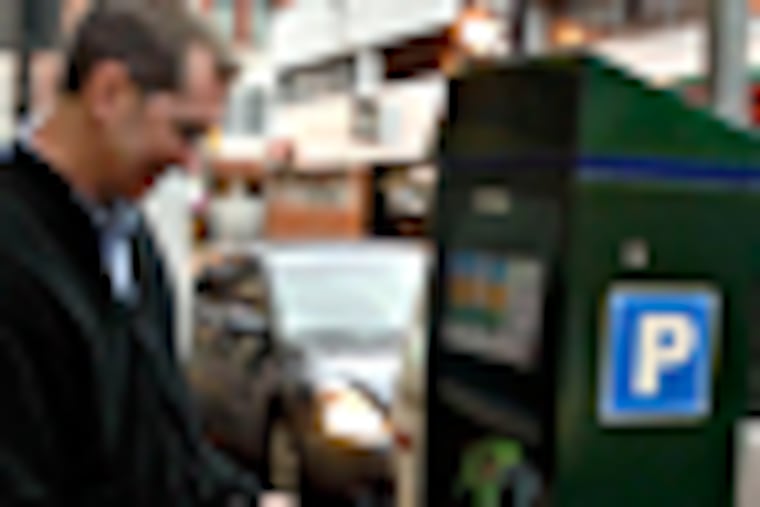Nice job, Parking Authority. No, really.
Is there an easier punching bag in all of Philadelphia than the Parking Authority? This is the agency that unites the city better than a championship parade on Broad Street, but in mass loathing, not love. Whether you're rich or poor, black or white, Rittenhouse- or Roxborough-born, nothing is more galling than finding ugly blue-and-white Parking Authority love letters on your windshield.

Is there an easier punching bag in all of Philadelphia than the Parking Authority?
This is the agency that unites the city better than a championship parade on Broad Street, but in mass loathing, not love. Whether you're rich or poor, black or white, Rittenhouse- or Roxborough-born, nothing is more galling than finding ugly blue-and-white Parking Authority love letters on your windshield.
"It is very easy to hate the Parking Authority, and everybody does it," acknowledges Rina Cutler, the city's deputy mayor for transportation. "It's very much like the IRS that way."
As former boss of the authority, Cutler should know. But she has also overseen parking enforcement agencies in Boston and San Francisco, where she found that public hatred of uniformed ticket writers ran just as deep as in Philadelphia. "It's just the nature of the business," she said.
Which makes sense. Deserved or not, getting a violation notice almost always infuriates. And anytime you have a government agency issuing 1.7 million tickets a year, there will inevitably be egregious screwups for the media to highlight (though, let's be real, the vast majority of those violation notices are valid).
But if anecdotal outrages and mass disdain are poor yardsticks for judging an agency, what should be looked at? Two things: money and effective management of parking supply and demand.
And by those measures, the Philadelphia Parking Authority is doing far better today than it was just a few years ago.
The state-run Parking Authority is budgeted this year to send the city and School District of Philadelphia $51.2 million ($37.3 million for the city, almost $14 million for the schools). That figure represents the difference between the agency's street-parking expenses and its total take in tickets and meter money. In other words, the profit.
Just five years ago, that figure was a paltry $20.6 million. Which means the authority generates 150 percent more cash for the city and schools today than in 2007.
To be sure, parking tickets and meter rates are higher. But operations are also more efficient and costs are lower, the product of a five-year agencywide salary freeze and a long-overdue reduction of staff.
"We're much leaner," said Vince Fenerty, the authority's longtime executive director. "We've learned to do more with less. We run as a business now."
This evolution wasn't entirely voluntary. For years, The Inquirer and Daily News have hammered the agency for its swollen executive salaries, overstuffed management suites, questionable consulting contracts, and more. And the Nutter administration has clearly kept a tighter rein on the agency's budget (which is subject to city approval) than did past regimes.
Fenerty and Cutler both said the PPA could probably improve the bottom line a bit further, but they warned not to expect much more contribution to the city and schools.
Perhaps they should try a little harder. As The Inquirer's Bob Warner wrote last week, Carl Ciglar - the Parking Authority's No. 2 executive - will retire next year with a $522,183 onetime pension payout plus $120,000 a year for life (courtesy of his $166,218 salary). Those numbers are ridiculous - more befitting a police chief or mayor than a public-sector parking executive.
But due to the wage freezes, the management attrition, and ongoing outside scrutiny, there are likely to be fewer Ciglar-sized salaries at the PPA in the future.
The agency's achievements in parking management are more modest, but not inconsequential. The new kiosks are working fairly reliably now, which has led to a small decline in violations (far easier to pay with a credit card than keep a roll of quarters, after all).
More important, the Parking Authority is increasingly in sync with a growing national custom to treat parking as a commodity, not a birthright. That means, where demand is high and supply limited, as in Center City, street parking should be expensive. Ideally, the price should be just high enough to ensure that drivers searching for a spot are always able to find one or two open spaces per block, thus cutting down on the congestion that cars create circling Center City like vultures looking for on-street parking.
Some cities are way ahead on this. San Francisco has embedded sensors in parking spots, and prices at its smart meters change depending on how much parking is available. And, yeah, they've got an app for that, which tells you exactly where to find a free spot.
Cutler said the city and the Parking Authority might try something similar, if the experiment works in San Francisco. Would it be enough to make us love the Parking Authority? Absolutely. Until the next time we get a ticket.